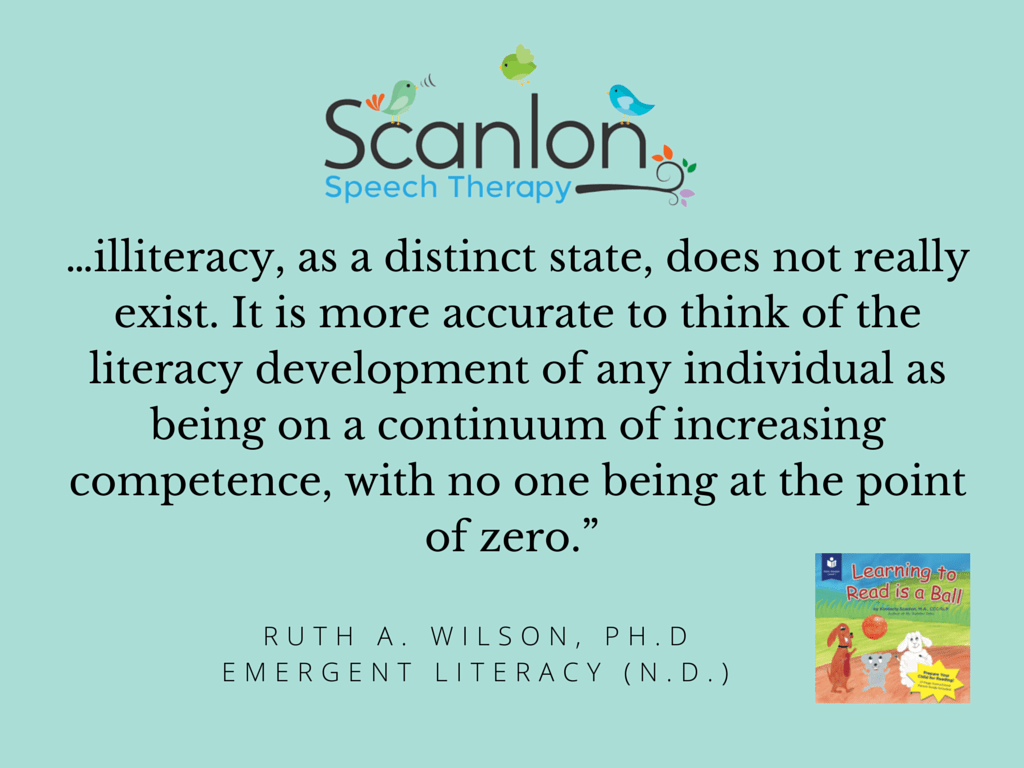Sign Up For Our E-Blast To Receive Information on our Books, Speech Therapy materials and our latest freebies!
Help My Child to Read: What is Emergent Literacy?
Emergent literacy is a general term used to describe the behaviors, skills, and knowledge that are present BEFORE children can read by themselves. Since the development of reading is complex, experts often describe its development as happening in stages or intervals. There are pre-emergent readers, early emergent readers, and emergent readers. Children progress through these stages at various ages and in different ways.
Often when we think of learning to read, we immediately think – phonics. However, learning to read is a process that starts long before the introduction to phonics. A strong foundation should be in place before a child is expected to learn how to sound out and decode words.
Children learn to read by gaining the following foundational literacy skills through observation and playful participation:
- oral language (e.g. vocabulary, story telling, etc.)
- print awareness (text has meaning as do the spaces and punctuations, etc.)
- phonological awareness (e.g. rhyming, alliteration, etc.)
- alphabet knowledge (e.g. knowing letter names and their sounds)
Depending on the home environment, parental involvement and know-how, these abilities can start emerging as early as birth and extend through the preschool years (hence the terms above).
Why Should You Care About Emergent Literacy?
- If you’re the parent to a young child and are hopeful that he or she will soon become a successful and passionate reader, then you should know something about how to facilitate emergent literacy.
- If you’re a speech language pathologist who treats young children who have language or articulation delays, then you should know about emergent literacy and how to promote it during your sessions.
- If you’re a teacher who teaches a toddler or preschool class, you should also know about to develop these foundational emergent literacy skills in your classroom.
When a child has enriched oral language skills and knows more about phonology, print, and letters, he or she is better prepared to achieve reading success.
Children who are most at risk for falling behind their peers in learning to read are:
Children with language delays, children who are English Language Learners, children from lower socioeconomic backgrounds and according to the American Speech-Language-Hearing Association (ASHA), “…those who may have various physical or medical conditions such as preterm birth requiring placement in a neonatal intensive care unit, chronic ear infections, fetal alcohol syndrome, cerebral palsy), developmental disorders (e.g., mental retardation, autism spectrum)…and family history of language or literacy disabilities.” (Roth, F.P, Paul, D.R. & Pierotti, A., 2006).
When children lag behind their peers in developing reading skills, it’s very challenging to catch up. If they don’t catch up they develop negative attitudes about reading and school.
Therefore, it’s very important to focus on developing strong skills before begin formal instruction can take place.
And, you know what? It’s pretty easy to promote the development of these emergent literacy skills once you have a few tricks in your bag. To learn some tricks, please check out my book, Learning to Read is a Ball.
Kimberly Scanlon, M.A. CCC-SLP is a speech language pathologist, an author and a mother. As the owner of Scanlon Speech Therapy, LLC, a unique boutique practice in Bergen County, Kimberly embraces individuality and treats the whole person. Her goal is to spread compassion, hope, and some speech, language and literacy tips one moment, one person at a time. Her first book, My Toddler Talks: Strategies and Activities to Promote Your Child’s Language Development and her second book, Learning to Read is a Ball
are available for purchase at online at Amazon and Barnes and Noble.
References:
Roth, F.P., Paul, D.R., & Pierotti, A. (2006). Emergent Literacy: Early Reading and Writing Development. Retrieved from http://www.asha.org
Wilson, R.A. (n.d.) Emergent Literacy. Retrieved from http://www.earlychildhoodnews.com


